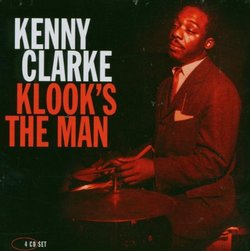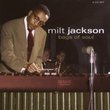| All Artists: Kenny Clarke Title: Klook's the Man Members Wishing: 2 Total Copies: 0 Label: Proper Box UK Original Release Date: 1/1/2007 Re-Release Date: 2/19/2007 Album Type: Import Genres: Alternative Rock, International Music, Jazz Styles: Ska, Caribbean & Cuba, Jamaica, Reggae Number of Discs: 4 SwapaCD Credits: 4 UPC: 805520021203 |
Search - Kenny Clarke :: Klook's the Man
 | Kenny Clarke Klook's the Man Genres: Alternative Rock, International Music, Jazz
Kenny Clarke was a jazz drummer and an early innovator of the BeBop style of drumming. As the house drummer at Minton's Playhouse in the early 1940s, he participated in the after hours jams that led to the birth of modern ... more » |
Larger Image |
CD DetailsSynopsis
Album Description Kenny Clarke was a jazz drummer and an early innovator of the BeBop style of drumming. As the house drummer at Minton's Playhouse in the early 1940s, he participated in the after hours jams that led to the birth of modern jazz. He is credited with creating the modern role of the ride cymbal as the primary timekeeper. Before, drummers kept time on the snare drum ("digging coal", Clarke called it) with heavy support from the bass drum. With Clarke time was played on the cymbal and the bass and snare were used more for punctuation. For this, "every drummer" Ed Thigpen said, "owes him a debt of gratitude." Clarke was nicknamed "Klook" or "Klook-mop" for the style he innovated. Clarke was a founder member of the Modern Jazz Quartet (as the Milt Jackson Quartet) in 1951 and also participated in many recording sessions as house drummer for Savoy Records. Similar CDs
|
CD ReviewsSolid Proper Box jive rhapsodist | NYC, NY United States | 12/20/2009 (3 out of 5 stars) "Solid...and also maybe a little stolid. Well, maybe that's too harsh. In general, the Jazz played on this set is not within my favorite genres. But I just couldn't resist. There have been so many times when I've been listening to a recording and I've found myself asking "who's that drummer?" and the answer has turned out to be Kenny Clarke. And he is amazing. So simple, so clear. And his precocious early career means that he brings more '30's style to the table than any other of the great Bop drummers do (he did some incredible playing with Sidney Bechet, for example). And for me, that's a compliment! Only one of my favorite Clarke sessions is here (The 52nd St. Boys, with Fats Navarro, Bud Powell, etc.), but there are some very interesting dates: my favorite is Bohemia After Dark - classic Hard Bop (let's not get into an argument about the difference between Bop and Hard Bop...) with Horace Silver, Cannonball Adderley, etc. I find this genre very mannered (the straight eighth notes, the quotes...like that) and not that intellectually compelling, but when it's brought off with this amount of élan, it's really infectious. So much attitude! But the next session, with John LaPorta on alto, is basically a snore. It is Jazz...I try to say more, but nod off when I do. It isn't bad - nothing's wrong with it...I'm very disappointed in liner note writer Joop Visser, though, who can tell us all of this minutiae about the players' careers, but who doesn't recognize that Volcano on this session is, shall we say, the part of Epistrophy that Clarke gets composers credit for (this piece also shows up as Iambic Pentameter on disc 1). That's what I hate about Jazz writing - so much names and dates, so little creative listening. But let's move on! Comes a sleepy session featuring Pepper Adams, Kenny Burrell, Tommy Flanagan, Paul Chambers...I'm not hatin', but this is the kind of Jazz that drove me into the arms of the Avant - Garde and Noise Music...But then! If reading André Hodier's jazz writing filled you with an enormous desire to get to know the music of the man who called Duke Ellington "a great predecessor" but who went on to accuse him of "crimes" (it did me!), you're in for a treat. Let's just say nothing ages faster than music which self-consciously tries to advance an idiom - compare Gunther Schuller's Third Stream works to the contemporary pieces of Ornette and Monk which inspired them, for example. All this very clever, very dead polyphonic writing, which gets in the way of the compositions ('Round Midnight, Jeru, Eronel...) it tries to enhance. But these recordings ARE entertaining period pieces, in a Fud Livingston kind of way (well, some of them - Bemsha Swing is tragic). And Martial Solal plays some unique piano (P.S. I'm shocked that Hodier uses Miles' bridge for When Lights Are Low rather than composer Benny Carter's - duly not noted by Visser).
There's plenty more I haven't written about - and I guess I will. Don't worry, I won't hate you if you stop here. Disc 1 - 4 mediocre cuts recorded by a unit out of the Edgar Hayes band recorded in Sweden in 1938 featuring Clarke on Xylophone (!). The 4 aforementioned 52nd St. Boys tracks. Then the rest of the disc features more French Jazz musicians of the '40's than you ever knew - or cared - existed. There's a tenor player named Jean - Claude Fohrenbach who's quite good in a Swing to Bop kind of way. And Hodier can play Jazz violin more than respectably! But some of the guys...one pianist plays the same intro on two tracks in a row (by the way, the track that's called Working Eyes is Ellington/Tyree Glenn's Sultry Serenade). The track with the excellent name Assy Pannassy (some inside French Jazz politics there) is actually good, because of a very special Latinate hook-up between Clarke and pianist Bernard Pfeiffer. The last 2 cuts on this disc return us to a real rhythm section (Gerald Wiggins,the great Pierre Michelot, Clarke) which makes these tracks seem better than they actually are. Disc 2 - Frank Morgan, Milt Jackson, Wiggins again, Percy Heath...4 cuts. Groovy, but they won't change your life. Then 4 tracks with a bunch of Basie - ites: Frank Wess, Henry Coker, etc. Ernie Wilkins arrangements - very serviceable, and not more. Coker sounds like Dicky Wells as a bopper. Then 7 Ernie Wilkins group tracks which were made for someone else - not me. In one ear, out the other. So...? You have to admire this set. Clarke is worth this kind of investigation. But he made many great records which are not represented here. I'm glad they chose to keep complete albums together, although I'm not very excited about most of the choices. Well, at least some of my curiosity about what Clarke played like when he wasn't playing on some of my favorite records has been assuaged. He played great. But he didn't make an average record essential. Rating - 3 1/2 Stars" |

 Track Listings (24) - Disc #1
Track Listings (24) - Disc #1


